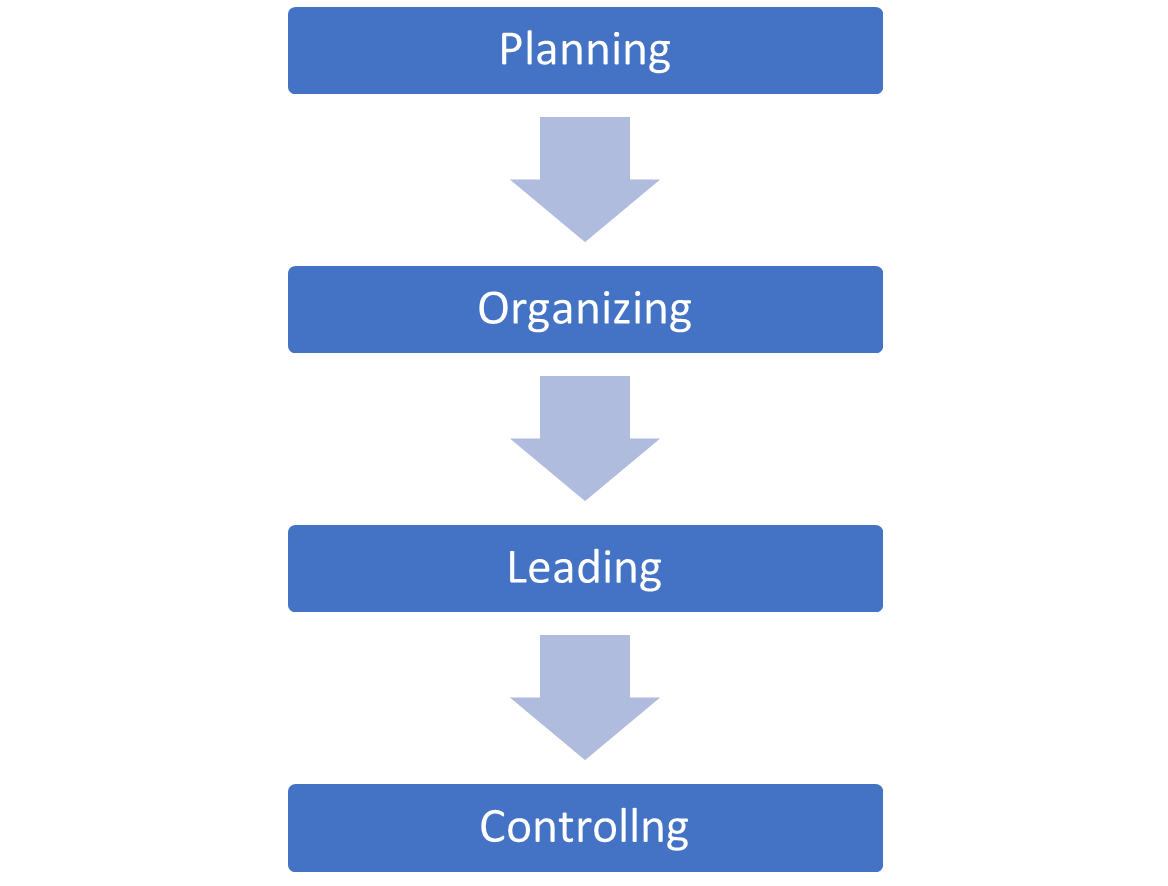Four Functions of Management: What Managers Should Know
A degree may open the door to a variety of opportunities and diverse career paths. The degree programs offered at AIU will not necessarily lead to the featured careers. This collection of articles is intended to help inform and guide you through the process of determining which level of degree and types of certifications align with your desired career path.
Managers have numerous responsibilities—they establish plans and policies; direct business activities; and oversee people, products and services.1 But to successfully guide a team toward achieving organizational objectives, it takes more than just having specialized knowledge in a particular department or field or certain technical skills. And that is where an awareness of the functions of management—planning, organizing, leading and controlling—comes in. Understanding these four management functions could help managers to keep their teams focused, conquer challenges and accomplish business goals.
What Are the Four Functions of Management?
Henri Fayol is credited as the first person to identify various management functions, which he spelled out in his 1916 work Administration Industrielle et Generale (General and Industrial Management).2 While his management theory actually included five functions of management (planning, organizing, commanding, coordinating and controlling), over time these five functions have been distilled down to the four functions introduced above: planning, organizing, leading and controlling.
Importantly, the four functions of management must be carried out in sequential order. This is because each function builds upon the one that comes before it. In other words, attempting to move from planning, to leading, to controlling and then to organizing management functions won't lead to the desired outcome. And this makes sense if you think about it—you can't organize what you haven't planned for, and you can't lead something that is disorganized. But when the four-function framework is properly applied in the pursuit of a particular organizational goal, it can be a powerful management tool.
Four Functions of Management

1. The Function of Planning in Management
The first of the four management functions is planning. This particular function of management involves identifying a goal or objective and coming up with a plan of action for achieving it. Strategic, tactical and operational planning are the three main types of planning in management:
- Strategic planning is focused on long-term goals, opportunities and threats that apply to the organization as a whole. Because it determines the direction of the entire organization, strategic planning is typically carried out by senior management.
- Tactical planning is focused on developing shorter-term goals that are connected to the organization's overall strategic plan. It has a narrower focus than strategic planning, resulting in measurable, timebound goals that are often focused on individual departments rather than the entire organization.
- Operational planning is focused on the day-to-day activities that, when taken together, serve as a roadmap or action plan for achieving the organization's broader strategic plans. Operational planning is concerned with identifying roles and responsibilities, evaluating resources, setting budgets, etc.
As you can see, planning in management defines an organization's path forward: an organization's long-term strategic goals are achieved by carrying out medium-term and short-term plans. However, the planning function may not always be a straightforward one in business management. Sometimes there is more than one way to accomplish a goal, and it is a manager's responsibility to identify the best way given all the circumstances.
2. The Function of Organizing in Management
The second of the four functions of management is organizing. Once a plan is in place, financial resources, additional personnel, interdepartmental collaboration and task delegation may all be required to accomplish the plan's goals. In this way, the organizing function is dependent on the planning function.
Examples of organizing in a management context might include allotting financial resources for hiring a certain number of new employees or for paying for overtime; coordinating the activities of one team (e.g., the software development team) with another (e.g., the sales and marketing team); or dividing or delegating responsibilities among members of a team based on each individual's skill set.
3. The Function of Leading in Management
The third function of management is leading. At first blush, managing and leading may seem like two different words that describe the same thing—but the definition of leadership in management is distinct. Management describes the ability to supervise or control people, tasks or resources needed to achieve a particular objective. Leadership, in contrast, describes the ability to guide, inspire and motivate people to contribute to the organization's success. The role of leadership in management is an important one because motivated teams want to succeed, and successful teams bring an organization closer to achieving its overall strategic goals.
While no specific formula or roadmap on how to become an effective leader exists, many leadership skills can be developed and improved with practice, experience or through education (such as through pursuing a business degree program). For example, effective communication skills may help managers not only convey clear goals and objectives but also help them guide their teams in accomplishing those goals. Active listening skills may help managers build trust between themselves and their team members and can sometimes result in new insights. Depending on the circumstances, the function of leading in management might involve using conflict management skills to help solve disputes or disagreements between coworkers or departments. It may involve using different management styles to bring out the best in each of the employees under a manager's supervision—for example, one team member may be most productive when offered frequent check-ins and regular assessments of their work, while another team member may be most productive with fewer check-ins and a generally more "hands-off" managerial approach.
4. The Function of Controlling in Management
The controlling function of management is the last of the four functions. Controlling in management is all about tracking/monitoring whether or how well everything is progressing toward the project goal or standards set during the planning phase. The process of controlling involves the following steps:
- Setting standards of performance.
- Measuring actual performance.
- Comparing that actual performance to the standards set to see if deviations are present.
- Analyzing any deviations, including why they occurred and if the amount of control or the standard should be changed.
- Taking corrective action, if necessary, which could include modifying the standards, among other solutions.
Periodically assessing whether a project is progressing on time and within budget is one example of controlling in management. If the project is not, the manager may need to determine why it is not meeting expectations and then make adjustments to control costs or schedule slippages. For example, if costs are higher than anticipated, a manager may have to reduce expenditures or find a way to procure additional funds. If there is a risk of missing an important deadline, a manager may need to assign additional employees to the project or bring in an outside contractor.

Study Management Skills in a Business Degree Program
The American InterContinental University (AIU) Bachelor of Business Administration (BBA) degree program is designed to provide a foundation for those who want to prepare to pursue advanced study or a career path in business or management. It offers an opportunity to demonstrate critical and analytical thinking through development of quantitative business solutions; collaboration in cross-functional teams; evaluation of potential ethical and legal issues; utilization of technology to strategically address business needs; and more.
The online business administration degree program can be completed in as little as one year.* Elective courses will vary depending on whether a specialization or the general track is chosen. Core courses may include the following:
- Principles of Accounting I
- Managerial Accounting
- Introduction to Business
- Legal and Ethical Environment of Business
- Quantitative Methods and Analysis
- Financial Management
- Management Information Systems
- Management and Leadership of Organizations
- Survey of Human Resource Management
- Global Operations Management
- Program Capstone
- Principles of Marketing
*AIU’s bachelor's degree programs are designed as 48 month programs; however; many factors will impact your time to completion, including course loads, proficiency and/or transfer credits and breaks.
Frequently Asked Questions
Some experts may classify the functions of management differently. For example, coordinating was one of Henri Fayol's five functions of management—but coordinating is no longer widely considered a function of management. Instead it is considered the essence of management. Similarly, staffing—which includes recruitment, selection, training, developing, promotion and compensation of employees—is often considered a primary function of management.
Generally speaking, of the four functions of management, the planning function is arguably the most important. This is because planning serves as the foundation on which the rest of the management functions are built. Without goals, objectives, standards and a plan of action, it is not possible to optimize the allocation of resources, track progress, measure benchmarks, analyze deviations, take corrective action and so on. However, unless you are a member of senior management, you may have limited direct input in an organization's planning. Depending on your role, therefore, one of the other management functions might be more important to carrying out your duties.
Work experience is one way to strengthen and develop management skills. Working may provide opportunities to utilize various skills that relate to one or more of the four functions of management. Formal education could also be beneficial. Pursuing a bachelor's degree in business administration could expose you to different management theories and principles that may be applied in real-world business management situations.
Interested in learning more? Explore AIU's full range of business degree programs today, or apply now.
1 Bureau of Labor Statistics, U.S. Department of Labor, Occupational Outlook Handbook, "Management Occupations," https://www.bls.gov/ooh/management/ (last visited Feb. 21, 2025).
2 Henri Fayol, General and Industrial Management, trans. Constance Storrs (Sir Isaac Pittman & Sons, Inc., 1949), https://archive.org/download/in.ernet.dli.2015.13518/2015.13518.General-And-Industrial-Management.pdf.
American InterContinental University cannot guarantee employment, salary, or career advancement. Not all programs are available to residents of all states. REQ2106886 2/2025
Related Articles
- Ten Types of Business Degree Specializations You Can Pursue
- Accounting Career Fields
- Can You Go To College with a GED?
- Developing Business Management Skills
- Do You Need a Degree To Start A Business?
- Earning a Master’s Degree in Accounting
- Graduate Certificate vs. Master’s Degree: What’s the Difference
- How Many Credits Are Needed for a Bachelor's Degree?
- Is Finance a Good Degree For Me?
- Is Marketing a Good Major?
- Earning a Distance Learning MBA
- Majoring in Finance: What to Expect as a Finance Major
- The Four Functions of Management: What Managers Need to Know
- What's the Difference Between Business Administration and Business Management?
- Why Your Associate Degree is an important step towards earning your Bachelor’s Degree